|
|
|
Sort Order |
|
|
|
Items / Page
|
|
|
|
|
|
|
| Srl | Item |
| 1 |
ID:
097587
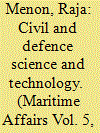

|
|
|
|
|
| Publication |
2010.
|
| Summary/Abstract |
The rise of China is an accomplished fact. Many analysts are today trying to describe the various aspects of that rise. Military power is probably the foremost of the aspects that we in India will like to define. This article attempts to put together the facts behind what China is trying to build indigenously and through reverse engineering. The overarching facts of China's military rise are unabashedly described by the Chinese themselves. By 2030, they expect that they will be at the same level of GDP as the United States. The Chinese foresee a decline in the currency of nuclear weapons thereby improving the importance of their huge conventional forces that separate them from the rest of the world. How will they arm this conventional force? The Chinese are even keener than the Indians that they should arm their armed forces without outside dependence. An attempt is made here to describe how successful they can be.
|
|
|
|
|
|
|
|
|
|
|
|
|
|
|
|
| 2 |
ID:
097583
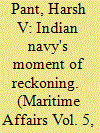

|
|
|
|
|
| Publication |
2010.
|
| Summary/Abstract |
The emergence of the Indian Navy (IN) in recent years as an indispensable tool of Indian diplomacy, has made it imperative for Indian policy-makers and naval thinkers to think anew its role in Indian strategy. There is a long tradition in India of viewing the Indian Ocean as a national backyard and, therefore, advocating a greater role for Delhi in underwriting the security and stability of the Indian Ocean Region. India's economic rise should prompt Indian strategic thinkers to bring that focus back and make the IN integral to Indian grand strategy. While China remains a significant concern, the bigger problem remains one of introducing organisational changes and doctrinal evolution. The author has brought out how management of these issues will be significant not only for the IN's future but also for the rise of India as a credible global military power.
|
|
|
|
|
|
|
|
|
|
|
|
|
|
|
|
| 3 |
ID:
097580
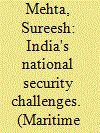

|
|
|
| 4 |
ID:
097588
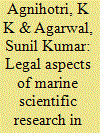

|
|
|
|
|
| Publication |
2010.
|
| Summary/Abstract |
The recent incident involving a United States ship (USS) Impeccable in the South China Sea has led to considerable debate over the jurisdiction of a coastal state to regulate marine scientific research (MSR) in its exclusive economic zone. This article examines the legal framework for MSR as embodied in the United Nations Convention on the Law of the Sea and interprets its provisions as applicable in the Impeccable 'incident' on the basis of the Vienna Convention on the Law of Treaties. This incident may set a wrong precedent for interpreting other international treaties on similar lines, the implications of which will be detrimental to international cooperation, as it can escalate tensions among the concerned countries. Hence, the matter may be taken up as an agenda item in the next Meeting of State Parties of UNCLOS (generally held in May-June every year) to clarify aspects related to maritime research and build a consensus on the issue.
|
|
|
|
|
|
|
|
|
|
|
|
|
|
|
|
| 5 |
ID:
097584
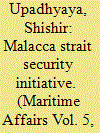

|
|
|
|
|
| Publication |
2010.
|
| Summary/Abstract |
The trilateral coordinated anti-piracy ship patrols in the Strait of Malacca and of Singapore (Straits)-codenamed Operation MALSINDO-by Malaysia, Singapore and Indonesia, which commenced on July 20, 2004 to combat the menace of piracy have completed more than five successful years. The regional states have jointly developed a unique mechanism for ensuring safety and security in the Straits. The littorals, mindful of their sovereign sensitivities, have consistently declined offers of assistance from India and other user states in the security patrols. Meanwhile, the security situation in the Indian Ocean region is evolving fast, throwing up fresh challenges. The number of piracy attacks doubled in 2009 from a year ago, with the largest number of attacks taking place in the Indian Ocean. Not surprisingly, a majority of the G20 navies are currently deployed in the Gulf of Aden on anti-piracy patrols. In the prevailing scenario, is the Malacca Strait Security Initiative (MSSI) geared to address future security challenges, when the maritime resources of the littorals have been stretched too far? Is the issue of sovereign rights of the littorals being taken too far at the cost of jeopardising the security of world shipping? This article provides an overall assessment of the current safety and security initiatives in the Straits and examines the emerging trends and challenges in combating non-traditional threats in the Indian Ocean region. The author concludes that the evolving security scenario offers many opportunities for regional states to cooperate with the Indian Navy in ensuring security of the Straits.
|
|
|
|
|
|
|
|
|
|
|
|
|
|
|
|
| 6 |
ID:
097581


|
|
|
| 7 |
ID:
097586


|
|
|
|
|
| Publication |
2010.
|
| Summary/Abstract |
Ocean noise, sometimes referred to as noise pollution, is the intentional or incidental introduction of human-generated (anthropogenic) sound energy into the marine environment. Examples of activities causing anthropogenic ocean noise include commercial shipping, recreational activities, natural resource exploration, underwater construction, scientific research and military sonar use. Whenever man interacts with the world's oceans, he puts sound energy into the water column. While considerable scientific uncertainty exists on the potential affects of anthropogenic ocean noise on the marine environment, some parties allege myriad adverse significant impact on living marine resources. The alleged impact runs the spectrum from reduced commercial fish catch rates to biologically significant behavioural impact, to marine mammal mass strandings, injury and mortality.
In recent years, a number of scientists, environmental non-governmental organisations (NGOs), and international bodies have shown a growing interest in anthropogenic ocean noise and its potential adverse impact on the marine environment, especially living marine resources, such as marine mammals. This interest is the result of advances in acoustic and marine mammal behavioural sciences, aggressive strategic communication campaigns by environmental NGOs, and a series of highly publicised marine mammal mass stranding deaths allegedly linked to scientific research and military exercises. This movement has, in turn, led several international bodies, regional organisations, and international groups to address the issue, convene scientific inquiries, take policy actions and even call for domestic and international regulation of anthropogenic sound-producing activities. Assuming these groups successfully implement international or regional restrictions/prohibitions, what, if any, impact will be there to domestic and international maritime security? Are the relevant parties considering the impact as they propose, formulate and implement ocean noise environmental protection treaties, agreements and policies? Can environmental protection ever be a threat to maritime security?
This article premises that regional or international regulation of ocean noise-producing activities, such as commercial shipping, natural resources exploitation and defence sonar use, constitute a non-traditional threat to domestic and international maritime security. It is a non-traditional threat precisely because most people think of activities purporting to advance environmental stewardship and protection of the world's marine resources as only beneficial endeavours. The anthropogenic ocean noise issue illustrates how some environmental protection actions can present unrecognised and often unaddressed, risks. Part One introduces the topic of anthropogenic ocean noise. Part Two summarises efforts by international and regional bodies to regulate anthropogenic ocean sound-producing activities through existing, modified and new international treaties, conventions and regional agreements. Finally, Part Three concludes that international regulations restricting or prohibiting vital domestic ocean sound-producing activities can result, if not safeguarded, in a significant threat to maritime security, national defence and the global economy.
|
|
|
|
|
|
|
|
|
|
|
|
|
|
|
|
| 8 |
ID:
097585
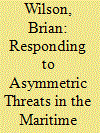

|
|
|
|
|
| Publication |
2010.
|
| Summary/Abstract |
Tension on the high seas between lawful commerce and illicit activity has existed for thousands of years, but today it represents a particularly serious challenge that requires more than just power projection; it requires innovative diplomacy, regional commitments, dedicated leadership and increased legal authority. In the maritime domain, there is no greater area of concern than asymmetric threats. Cooperation has unfolded to address some of these challenges, but states and international venues have yet to holistically confront the myriad threats emanating from the oceans. The desired result of every maritime attack may not necessarily be a judicial proceeding, but the ability and political will to prosecute is a critical factor in ensuring a safer maritime environment. When gaps in the law exist-whether in the area of illicit cargo, container security, underwater explosive devices or attacks in shipping channels-criminals and terrorists can operate with impunity. To address these gaps, states can better position themselves by strengthening the law, prioritising political and operational support, removing sanctuaries and authorising the pursuit of illicit assets.
|
|
|
|
|
|
|
|
|
|
|
|
|
|
|
|
| 9 |
ID:
097582
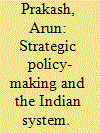

|
|
|
|
|
|
|
|